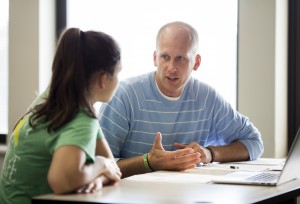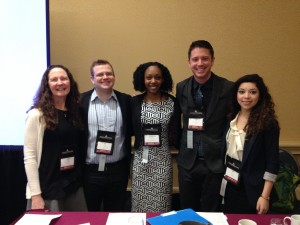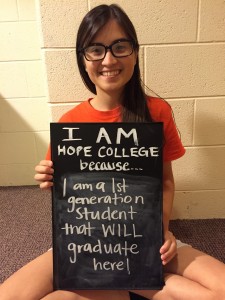The time between high school graduation and college enrollment is fraught with excitement and anticipation for almost every incoming freshman. It’s also a time filled with more questions and some anxiety, too. “How do I know the exact classes I should be taking?” “What will my college professors expect of me?” “Who will be my friends?” “Where do I get my ID photo taken again?”
Each question is valid and not uncommon nor unexpected to be asked during that time in the “in-between;” those 12 weeks from May 1 (enrollment deposit day) to the end of August (new-student-orientation weekend). And it is exactly for that time period that Hope College has been developing new summer initiatives, dovetailed with its already established fall first-year programming, to help incoming students transition to college.

Since the summer of 2014, Hope has instituted – under the direction of both Dr. Ryan White, director of advising, and Chris Bohle, associate director of student development – two programs that provide greater communication and support to soon-to-be Hope freshmen. New Student Advising Days are half-day summer campus events that are open to all freshman and prepare students for their academic transition to college by facilitating class registration and introducing students to academic advisors, other staff, and programs. The Summer Bridge Program is an invitation-only, living-and-learning experience that supports those who would benefit for earlier exposure to college life. Students stay a week on campus in mid-August, take a one-credit college writing course, experience cultural aspects of campus life, have meetings with peer and faculty mentors, and engage key institutional personnel and offices.
Each experience helps incoming students become more academically and culturally prepared for their first day at Hope.

Each experience helps incoming students become more academically and culturally prepared for their first day at Hope.
Bohle and White, along with Dr. Marla Lunderberg, associate professor of English and director of Hope’s FOCUS program, and Alexis-Simone Rivers, student-director of First Year Transitions, were recently selected, after being vetted through a competitive, blind-review application process, to present about these Hope programs at the 35th annual National Conference on the First Year Experience at the University of South Carolina. While they are quick to explain that both of these initiatives are not novel to higher education, the way that they’ve been constructed at Hope is.
“We use current Hope students to build and support these programs,” says White. “That’s what makes us unique. We did not use a top-down approach with administrators only planning out each program and saying, ‘this is how it is going to be.’ We wanted peer-leaders. We wanted our current students walking alongside incoming freshmen. That is really the Hope way. Our students are good leaders so we let them lead.”
‘We listen to the concerns of the students and identify how we can best help them or direct them to different resources on campus,” adds Rivers, a senior international studies major. “We’re not only a director or leader to these students, but many times we often become an unofficial mentor once the school year begins. That personal mentoring connection with the students is how I believe student directors make the biggest difference…. Also, our roles as student directors are very influential in the fact that incoming students are able to see how we were once in their position and now we are leaders on campus.”
“College is one of those things every incoming freshman has not experienced yet so they don’t know what to expect,” says Bohle. “A lot of times new students don’t know what to ask. With our summer initiatives and other first-year experiences, we want to answer some of their unspoken questions and help to normalize an understanding of expectations. “
Peer-advisors, alongside First-Year Seminar faculty, talk incoming freshman through several aspects of class selection and general education, as well as major requirements during three New Student Advising Days in June. The Hope students relay classroom experiences that were beneficial for them and could be for new students, too. “The big thing about new student advising is we find incoming freshmen are leaving less anxious about registration and feeling more connected to campus, and our students are a big reason for that,” says White.

For the Summer Bridge, Bohle says Hope students who work with the program are primary points of contact between those enrolled – 20 the first summer and 30 this summer – and the teaching faculty. “With Summer Bridge, our current students function as RAs (resident assistants) in Cook Hall and TAs (teaching assistants) in class; they give extended tours of Hope and Holland; they serve as peer mentors and work side by side with new students on a service project; they debrief the new students each night to hear what they are learning or concerned about and bring it back to us,” says Bohle. “Hope students are there, walking through the experience with Summer Bridge students in a way that we (faculty and staff) cannot.”
Each summer initiative is a forward-looking, Hope-strength-based experience that leads into bigger things to come, namely, Hope’s four-day freshman orientation. Orientation is held just prior to the first day of fall classes. Additional year-long academic and cultural support is to come on campus, especially from First Year Seminar faculty and in programs such as Phelps Scholars, Day 1, and Time to Serve. But in the time in the in-between, incoming students are already having meaningful experiences preparing them to be full-fledged college students in the fall.
“College is one of those things every incoming freshman has not experienced yet so they don’t know what to expect,” says Bohle. “A lot of times new students don’t know what to ask. With our summer initiatives and other first-year experiences, we want to answer some of their unspoken questions and help to normalize an understanding of expectations. Across the board, we feel we’re doing that. These summer programs really have been positive things.”

